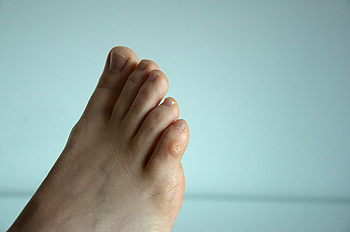
Dr. Kenneth Rosenthal
Dr. Jonathan C. O’Quinn
Dr. Michael J. Price

Dr. Kenneth Rosenthal
Dr. Jonathan C. O’Quinn
Dr. Michael J. Price
 Corns are formed by a buildup of hardened and dead skin, normally around the top of the foot, side of the foot, or on the toes. Corns have a cone-shaped core that can press down on the nerve beneath it, leading to pain. The most common cause of corns is wearing poorly fitting shoes that produce excess friction when they rub against the foot. Already existing corns can become inflamed by friction as well. Activities like running and climbing can also lead to corns. The most common solution to treating corns is wearing properly fitted footwear. It is important to wear shoes with a wide toe box, and to avoid shoes that are too tight or too loose. If you have corns on your feet that are persistent or causing you discomfort, or if you are diabetic, it is highly recommended that you consult with your local podiatrist.
Corns are formed by a buildup of hardened and dead skin, normally around the top of the foot, side of the foot, or on the toes. Corns have a cone-shaped core that can press down on the nerve beneath it, leading to pain. The most common cause of corns is wearing poorly fitting shoes that produce excess friction when they rub against the foot. Already existing corns can become inflamed by friction as well. Activities like running and climbing can also lead to corns. The most common solution to treating corns is wearing properly fitted footwear. It is important to wear shoes with a wide toe box, and to avoid shoes that are too tight or too loose. If you have corns on your feet that are persistent or causing you discomfort, or if you are diabetic, it is highly recommended that you consult with your local podiatrist.
Corns can make walking very painful and should be treated immediately. If you have questions regarding your feet and ankles, contact one of our podiatrists of Eastern Carolina Foot & Ankle Specialists. Our doctors will treat your foot and ankle needs.
Corns: What Are They? And How Do You Get Rid of Them?
Corns are thickened areas on the skin that can become painful. They are caused by excessive pressure and friction on the skin. Corns press into the deeper layers of the skin and are usually round in shape.
Ways to Prevent Corns
There are many ways to get rid of painful corns such as:
Treating Corns
Although most corns slowly disappear when the friction or pressure stops, this isn’t always the case. Consult with your podiatrist to determine the best treatment option for your case of corns.
If you have any questions please feel free to contact our office located in Greenville, NC . We offer the newest diagnostic and treatment technologies for all your foot and ankle needs.